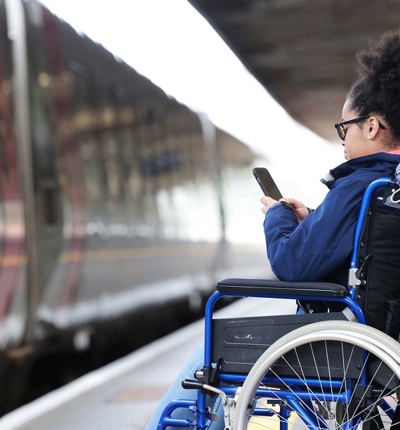
Discrimination claims
Contact our discrimination team today
Discrimination can sadly happen in almost any situation. If you’ve experienced discrimination by an organisation or individual, either in the private or public sector, that’s unresolved, we can help.
At Leigh Day, we act for people who have suffered discrimination at the hands of service providers (for example shops and venues), local authorities, central government and healthcare providers. This could be unlawful practices within the organisation, or public body decisions affecting protected characteristics including:
- Age
- Disability
- Gender reassignment
- Marriage and civil partnership
- Pregnancy and maternity
- Race
- Religion or belief
- Sex
- Sexual orientation
We work to help everyday people get the compensation and justice they deserve after facing unfair treatment. Contact our discrimination team today for expert advice and support in making your discrimination claim. For claims around unfair treatment in the workplace, visit our discrimination at work page.
Get help today
Fill in our short form and we will be in touch
Your rights around discrimination
The Equality Act 2010 protects people from unfair treatment, by making all forms of discrimination unlawful. This includes:
- Direct discrimination – where you are treated less favourably than others because of your age, disability, race, religion, sex, sexuality, gender reassignment or other protected characteristic.
- Indirect discrimination – any policies or practices by an organisation that place you at an unfair disadvantage because you have a protected characteristic.
- Harassment – unwelcome behaviour due to your protected characteristics.
- Victimisation – being treated unfairly after reporting discrimination.
If you have experienced any of the above, you may be able to take legal action. This includes bringing a discrimination claim against a private body in the County Court or a judicial review of a decision by a public body.
Types of discrimination
The Equality Act 2010 outlines specific characteristics that are protected from discrimination in a public setting. Examples of these include:
- Age – you are made to pay more for a service because of your age.
- Disability – you do not have access to the same services as those without a disability.
- Gender reassignment – you are prevented from using services that align with your gender identity.
- Race – you are not allowed to join a club because of your race.
- Religion or belief – a school does not allow their students to wear a hijab.
- Sex – you are treated less favourably than someone of the other sex. For example, men having to pay entry into a nightclub when women get in for free.
- Sexual orientation – being asked to take a HIV test before you can receive a service, such as insurance.
- Pregnancy and maternity – you are told you are not allowed to breastfeed in a café.
If you have experienced discrimination based on one of the above characteristics, you could be entitled to compensation and could ask the Court to order that the service provider amends its policies to prevent discrimination happening again.
Get help today
Fill in our short form and we will call you back
Who can you make discrimination claims against?
You can make a civil discrimination claim against any business, organisation, club or society providing a service to the general public that takes discriminatory action. This includes public bodies as well as private businesses, such as:
- Local councils
- Healthcare providers – including the NHS
- Emergency services – such as the police
- Schools, colleges and universities
- Government departments – like the DWP
- Individual retailers and outlets
- Transportation companies – such as public buses and trains
- Private clubs and organisations
- Leisure providers – including gyms
How to bring a discrimination claim
If you believe you’ve been discriminated against under the Equality Act 2010, you may be able to bring a claim in the civil courts. This process can be long and complex. Therefore it’s a good idea to contact one of our expert solicitors, who can advise, support you and offer representation if required.
Once you’ve contacted our discrimination team at Leigh Day, we’ll ask you a few questions about your case and the discrimination you faced. We may also ask for any evidence you may have to support your claim, such as:
- Witness statements – did anyone see the discrimination take place?
- Records – are there any emails, letters or recorded communication showing discrimination?
- Responses – have you tried to resolve the situation with the defendant? How did they respond?
After that, we’ll help you start the legal process. We’ll also advise on how best to act following the defendant’s response, to try and get the best possible outcome.
In most instances, you only have six months less one day from the date the discrimination occurred to make a private law claim in County Court. If you want to challenge a public body by way of judicial review, you only have three months from the date of the unlawful act or omission. It’s therefore important to reach out to our team as soon as you’re comfortable talking about the unfair treatment you faced.
If you’re claiming for a series of discriminatory acts by the same body, it may be possible to argue this is a continuing act and that the time limit should run from the last known incident.
If your discrimination claim is successful, you may be able to secure compensation for any distress or financial loss you incurred as a result of the discrimination. This will vary by case but may include:
- Injury to feelings – any emotional distress the discrimination caused.
- Personal injury – either physical or mental injuries caused by your unfair treatment.
- Aggravated damages – if the defendant acted unkindly or purposely discriminated against you.
- Loss of income – if you have had to take time off work because of your discrimination.
If you are unable to pay for the costs of bringing a claim to court, you may be eligible for legal aid. Legal aid is available for both private law discrimination claims in the County Court and for claims for judicial review against public bodies. For more information, check out our practical guide to legal aid.
Why choose Leigh Day?
Our leading human rights team have acted in many successful and high-profile discrimination claims against public and private bodies.
The team's discrimination work spans a wide range of areas, including:
- Disability rights
- Local government policies
- The provision of goods and services.
We’ve represented clients in one-off acts of discrimination, as well as supported cases involving unlawful policies affecting thousands of people.
Our team has a genuine commitment to equality law, and we fight hard to achieve results that change the way private and public bodies treat protected groups. We also work closely alongside NGOs and the Equality and Human Rights Commission to identify systemic issues affecting large number of people, to offer advice and training to grassroots organisations.
Our work fighting discrimination
Our expert discrimination team have successfully represented clients to secure wider change, alongside claims for compensation. Some of our key cases include:
- Student Loans Company – we secured compensation for a blind student who couldn’t access her university’s Disabled Students’ Allowance form.
- Ministry of Justice – we successfully secured a settlement for a disabled prisoner when their life was made more difficult in prison.
- Royal Herbert Pavilions – we supported our client James in his case against his housing association, who refused to make reasonable adjustments to cater to his disability.
- Norfolk Council – after a six-year battle, we helped Rachael secure more accessible communications from her local council.
- The Government – a successful legal challenge to voting provisions for blind and partially sighted voters.
- The Government – we secured fundamental governmental promises to a change in pandemic communications for the blind and visually impaired.
- The City of London – a legal challenge was issued for claims that the new charging regime at Hampstead Ponds discriminates against disabled people.
News and blogs

Nonbinary citizen to take gender recognition legal challenge to the European Court of Human Rights
Ryan Castellucci and their legal team are preparing to file an application to the European Court of Human Rights (ECtHR) over their right to have their non-binary identity recognised.

3,500 members of the armed forces join legal claim over discriminatory military housing charges that could cost the MOD up to £50 million
More than 3,500 serving members of the armed forces have joined a discrimination claim against the Ministry of Defence likely to be worth up to £50 million, after younger and unmarried personnel were charged higher rents for military housing.

Manchester City fans call for club to scrap “discriminatory” season ticket policy
Trade Union Blues have urged Manchester City Football Club to rethink a recently introduced minimum-game season policy, which they believe is the first of its kind in the country and unlawfully penalises fans unable to attend matches.

